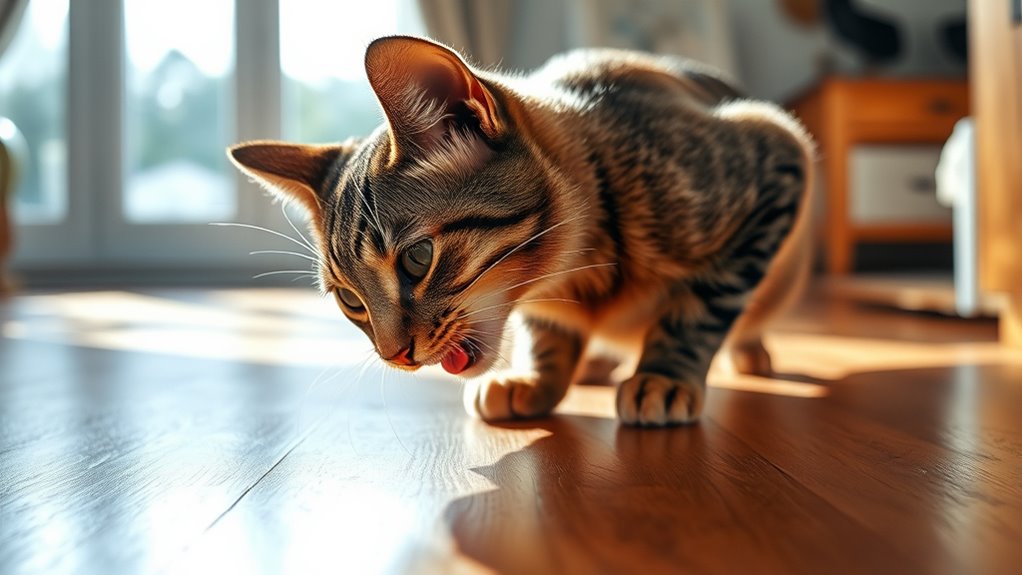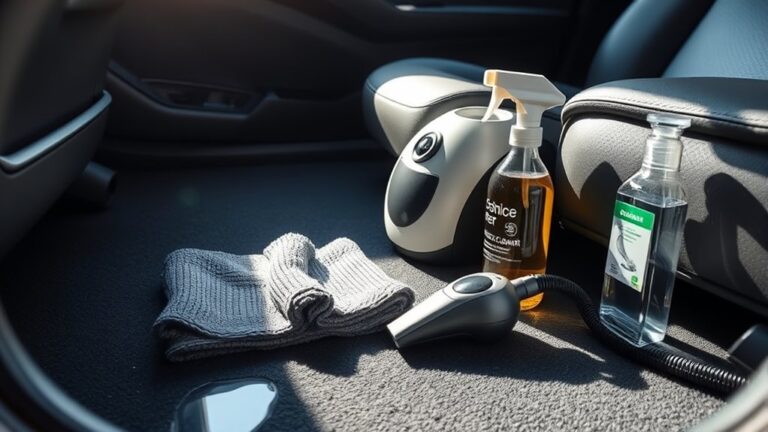If your cat is licking the floor frequently, it could be due to natural curiosity, boredom, or anxiety, as they explore scents and tastes. However, it might also signal health issues like nausea, dental discomfort, or nutritional deficiencies. Pica, a craving for non-food items, can also cause this behavior. It’s important to observe for other symptoms and consider a vet visit if licking persists. Understanding why your cat does this can help you better support their well-being.
Common Reasons Cats Lick the Floor
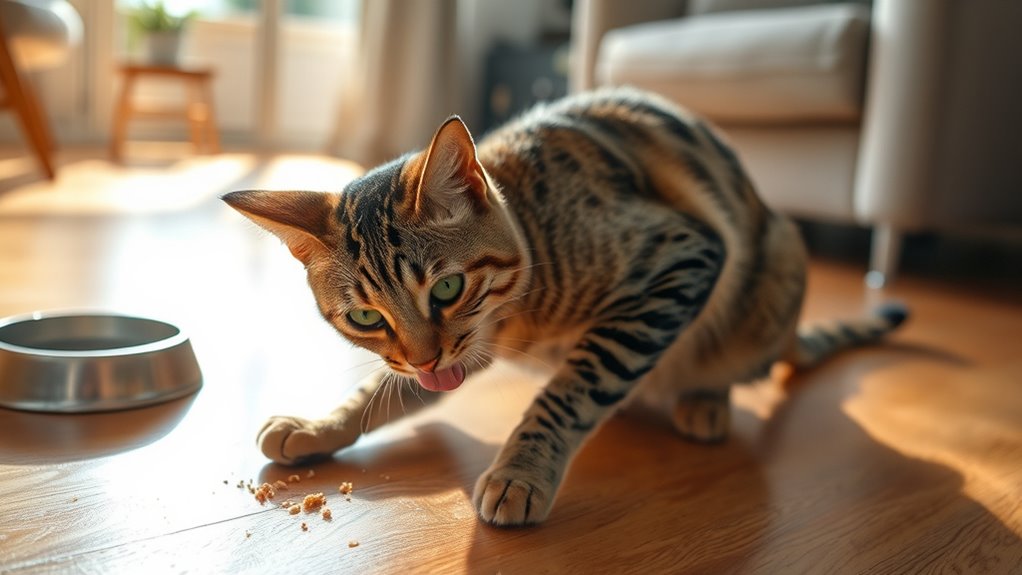
Although it might seem unusual, your cat licking the sol is often linked to specific behavioral or health causes. Understanding cat behavior helps you recognize that this action can stem from feline instincts such as exploration and scent-marking. Cats use licking to investigate their environment, picking up tastes or residues invisible to you. This behavior often reflects their need to connect with their surroundings in a way that feels natural and freeing. Additionally, some cats develop habits of floor licking due to stress or boredom, seeking sensory stimulation. By observing these patterns calmly, you respect your cat’s innate drives while addressing any underlying needs. Recognizing these common reasons empowers you to support your cat’s wellbeing without restricting its essential freedom.
Health Issues That Cause Floor Licking
While some floor licking may be linked to natural behaviors or stress, it’s important to contemplate that this action can also signal underlying health problems. Certain medical conditions, such as nausea, gastrointestinal issues, or oral discomfort, may cause your cat to lick surfaces compulsively. Licking disorders, a group of compulsive behaviors, might manifest as excessive floor licking and can indicate neurological or dermatological problems. If you notice your cat persistently licking the floor alongside other signs like vomiting, weight loss, or changes in appetite, it’s essential to consult your veterinarian promptly. Early diagnosis and treatment not only relieve your cat’s discomfort but also prevent potential progression. Understanding these medical conditions empowers you to protect your cat’s well-being and maintain their freedom to thrive.
Behavioral Causes of Floor Licking
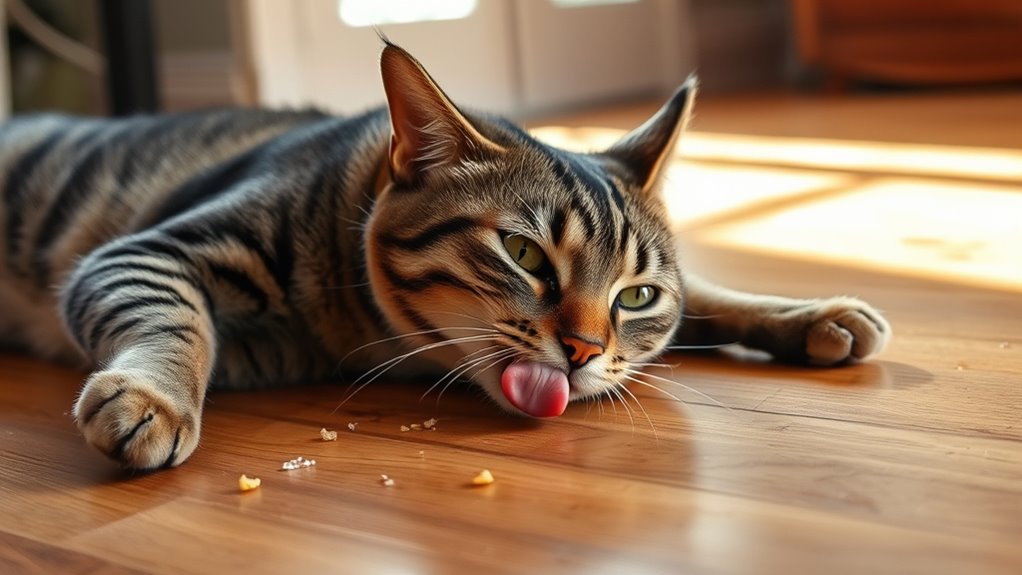
When your cat licks the floor without any apparent medical issues, behavioral factors are often at play. Understanding licking triggers and behavioral patterns can help you support your cat’s well-being and freedom to express natural behaviors. Cats may lick floors out of boredom, stress, or as a displacement activity when unsure how to react.
| Behavioral Cause | Description | Possible Trigger |
|---|---|---|
| Boredom | Seeking stimulation | Lack of toys or interaction |
| Anxiety | Self-soothing mechanism | Changes in environment |
| Displacement | Redirected behavior | Conflicting stimuli |
The Role of Smells and Tastes
Because cats rely heavily on their keen sense of smell and taste to understand their environment, these senses often influence why they lick the floor. You might notice your cat drawn to specific spots due to scent attraction—residual odors from food, spills, or even invisible traces that pique their curiosity. This licking behavior serves as a form of taste exploration, helping your cat gather detailed information about their surroundings. Understanding this can help you appreciate their natural instincts rather than seeing the behavior as purely problematic. While it may seem odd, this sensory investigation is essential for your cat’s freedom to interact with their world fully. By recognizing the role of smells and tastes, you can better support your cat’s exploratory needs in a safe and healthy way.
Dietary Deficiencies and Pica
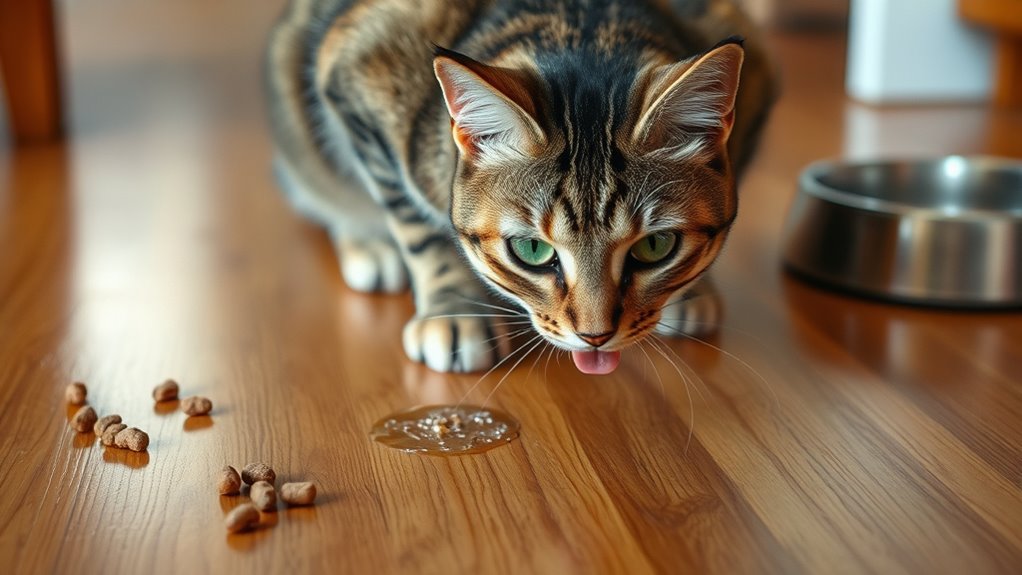
If your cat is licking the floor frequently, it might be a sign of nutrient deficiencies affecting their behavior. Pica, the urge to eat non-food items, can stem from these dietary imbalances or other health issues. Understanding these causes can help you address your cat’s needs more effectively.
Nutrient Deficiency Signs
Although it might seem unusual, your cat’s persistent licking of the floor could signal an underlying nutrient deficiency. Nutritional imbalances, especially vitamin deficiencies, may drive this behavior as your cat instinctively seeks missing nutrients. For example, inadequate levels of essential vitamins or minerals can lead to abnormal cravings or pica-like actions, such as licking or chewing non-food surfaces. It’s important to recognize these signs early, as they may indicate that your cat’s diet isn’t meeting its complete nutritional needs. If you notice this behavior, consider consulting your veterinarian to evaluate your cat’s diet and overall health. Addressing potential deficiencies promptly can restore your cat’s well-being and reduce the urge to seek nutrients from inappropriate sources like the floor.
Pica Behavior Causes
When your cat starts exhibiting pica behavior, such as licking or chewing non-food items like the floor, it often points to underlying dietary deficiencies. These nutritional gaps can trigger cravings for unusual substances as your cat seeks missing nutrients. If you notice this, pursuing a thorough pica diagnosis with your veterinarian is essential to identify any specific deficiencies or medical issues. Addressing these causes early allows for targeted treatment, which may include dietary adjustments. Alongside medical intervention, behavioral therapy can help redirect your cat’s focus away from harmful habits, promoting healthier behaviors. Understanding these causes empowers you to support your cat’s freedom from discomfort and prevent potential complications linked to persistent pica behavior.
How to Monitor Your Cat’s Licking Habits
You’ll want to carefully track how often and how long your cat licks the floor to identify any patterns. Pay close attention to environmental triggers that might prompt this behavior. Also, record any changes in your cat’s overall behavior to provide useful information for your veterinarian.
Tracking Frequency and Duration
Regularly observing your cat’s licking behavior is crucial to understanding its underlying causes. Tracking frequency and duration helps you identify abnormal licking patterns that may indicate stress or medical issues. To monitor your cat effectively:
- Note the number of licking episodes per day and their length to establish a baseline.
- Record specific times when licking occurs to detect any recurring patterns.
- Use a simple journal or app for consistent frequency tracking to guarantee reliable data over time.
Noting Environmental Triggers
Although tracking frequency and duration provides valuable insights, understanding what triggers your cat’s floor licking is equally important. Environmental stimuli such as noises, smells, or changes in floor cleanliness can provoke this behavior. By carefully noting these factors, you gain a clearer picture of your cat’s motivations and needs. Use the table below to log potential triggers and responses, helping you identify patterns without feeling confined.
| Environmental Stimuli | Possible Effect on Licking |
|---|---|
| New cleaning products | Increased licking |
| Food crumbs | Licking focused on spots |
| Loud noises | Stress-related licking |
| Changes in floor type | Curiosity-driven licking |
| Presence of other pets | Anxiety-induced licking |
Monitoring these triggers empowers you to create a freer, healthier environment for your cat.
Recording Behavioral Changes
Understanding the environmental triggers behind your cat’s floor licking gives you a foundation, but observing how their behavior evolves over time offers deeper insight. Through consistent behavioral observation, you can detect shifts in licking patterns that may indicate underlying health or emotional issues. To effectively monitor your cat’s habits, consider these steps:
- Keep a daily log noting the frequency, duration, and specific locations of floor licking.
- Record any concurrent behaviors or changes in routine that coincide with increased licking.
- Use video recordings to capture subtle variations in licking intensity or mannerisms.
When to Seek Veterinary Advice
If you notice your cat persistently licking the floor despite attempts to redirect their behavior, it’s important to contemplate consulting a veterinarian. Careful symptoms observation can reveal underlying health issues such as gastrointestinal problems, dental pain, or neurological disorders that might be causing this unusual behavior. Pay attention to additional signs like vomiting, changes in appetite, or lethargy, as these can guide the veterinarian consultation. Seeking professional advice early guarantees your cat receives an accurate diagnosis and appropriate treatment, preventing potential complications. Remember, while some floor licking may seem harmless, persistent or excessive behavior often signals a need for medical evaluation. Trust your observations and prioritize your cat’s well-being by involving a veterinary expert when necessary.
Tips to Discourage Floor Licking
Since floor licking can sometimes indicate underlying issues, addressing it promptly is important to guarantee your cat’s comfort and health. You can use effective discouragement techniques to reduce this behavior while maintaining your cat’s freedom to explore safely. Begin with thorough floor cleaning to remove any appealing residues or scents that might attract your cat. Next, redirect their attention by providing engaging toys or activities that satisfy their curiosity and oral fixation. Finally, create gentle deterrents in the areas your cat frequents, like placing textured mats or using safe, pet-friendly sprays.
- Maintain consistent floor cleaning to eliminate taste triggers
- Offer stimulating alternatives to keep your cat engaged
- Use subtle deterrents to discourage licking without causing stress
These steps help address the behavior compassionately and effectively.

